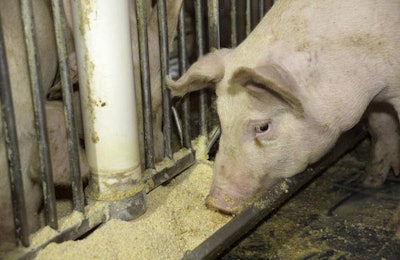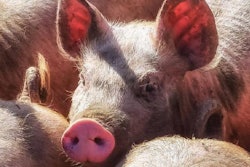
That African swine fever (ASF) has been confirmed at two commercial farms in different regions of Poland within one month must be matter for concern for a country fighting a long-running battle against the disease in its wild boar population. New outbreaks of the disease have also been confirmed in domestic pigs in China, Hong Kong, Romania, South Africa, Ukraine and Vietnam.
Poland’s agriculture ministry has reported to the World Organisation for Animal Health (OIE) a third ASF outbreak in domestic pigs. More than 60 animals died at a farm in the district of Gmina Orla in the province of Podlaskie, and almost 8,000 more pigs were culled after the ASF virus was detected.
This was the largest ASF outbreak in the Polish commercial pig meat sector so far, and it comes after an outbreak at a farm with around 1,700 pigs in neighboring Warmia-Masuria in mid-May. The ASF virus has been detected in wild boar in the same provinces since 2018.
Also in Europe, there have been further cases of ASF in domestic pigs in Romania. Latest to be affected, according to the official report to the OIE, have been three herds described as “backyard,” totaling 70 animals. Two of the outbreaks were in the south of the country, and the other in the northwest.
The veterinary authority in Ukraine has reported to the OIE one new outbreak of ASF in a backyard herd in the region of Vinnitsa in the west of the country. In this, the third outbreak in the area, 11 animals died and a further 110 have been culled to prevent further spread of the disease.
Vietnam: new outbreaks, pork imports planned
Over the past week, the Vietnamese agriculture ministry has reported a further 20 ASF outbreaks to the OIE. The virus was detected in what is described as “village herds,” which ranged in size from six to 452 animals — 1,205 in total. The affected premises were located in 10 provinces in central and southern Vietnam. Losses of animals through mortality or culling reported to the OIE are now approaching 1.34 million.
Losses of pigs as the result of ASF for the first four months of this year have reached 1.5 million or 5% of the total count, according to Vietnam’s Ministry of Industry and Trade (MoIT). The virus has been detected in 53 cities and provinces.
As a result, more pork will need to be imported into the Southeast Asian country, reports Vietnam News. Currently, reduced demand is being blamed for a drop in pork prices. Since start of the outbreaks, prices are down up by VND6,000 (US$0.26) per kilo in the north of the country, and by VND10,000 (US$0.43) in the south, but demand is forecast to pick up again in the coming months.
More ASF detected in China, Hong Kong
After a brief absence, the Hong Kong Special Administrative Region government has recorded the return of ASF to the area. As in an earlier outbreak, the virus was detected among a group of “imported” pigs at a slaughterhouse in the New Territories. This time, there was one case among more than 4,000 animals at the same Sheung Shui facility. Operations there were suspended immediately, all animals were culled and the carcasses disposed of, and thorough cleaning and disinfection are being carried out.
In Mainland China, ASF was detected in a group of 32 pigs stopped at a toll on a main highway near Duyun city in Guizhou province at the end of May, according to the agriculture ministry report to the OIE. No health certificate accompanied the animals. One pig died, and the rest were destroyed. A previous outbreak in the southern province was detected at a slaughterhouse earlier in the month.
In neighboring Guangxi Zhuang Autonomous Region, ASF has been detected a single pig in Yunlin city prefecture, according to the official report to the OIE. Previous cases in the province were in farm in different regions in February and March.
China’s agriculture ministry has in the past week confirmed a lifting of restrictions on the transport of pigs in Diqing prefecture in Yunnan province, and Nyingchi Bayi district of the Tibet Autonomous Region.
After seven confirmed outbreaks of ASF in the country this year, Cambodia’s veterinary authority has declared the disease situation “resolved” to the OIE. The most recent cases were detected in Ratanakiri province in early April.
South Korea, Taiwan concerned over North Korean ASF situation
Last week, a North Korean newspaper warned of the threat of ASF. According to South Korean news agency, Yonhap, state media in the Democratic Republic have not mentioned so far that at least one outbreak of the disease has occurred in the country. The same source reported that Pyongyang has yet to respond to the Seoul government’s recent offer of help to control the spread of the disease in North Korea.
The ASF outbreak in North Korea has made South Korea a “high-risk country” for ASF, according to Focus Taiwan. As a result, hand luggage for passengers arriving from both countries at Taiwan Taoyuan International Airport will now be subject to X-ray screening to ensure it contains no pork products.
Since Taiwan began this additional screening for passengers from countries affected by ASF or at high risk of the disease in December 2018, almost 90 passengers have been fined for infringement of the ban.
Philippines’ authorities find illegal pork imports
This week, authorities in the Philippines seized pork from a ship at the port of Subic Bay, reports Manila Times. The cargo of Chinese pig meat products — reported to be worth PHP6.0 million (US$115,000) — is to be destroyed. In 2018, the Filipino government banned all pork imports from China because of the risk of infecting the country’s pig population with ASF.
One new ASF outbreak in South Africa
A further outbreak of ASF has been confirmed to the OIE by South Africa’s agriculture ministry, bringing the country’s total so far to five. Affecting a backyard herd of almost 100 animals, the latest outbreak was in the Ekurhulemi area of Gauteng province, where previous cases were detected at the end of April this year.
ASF in wild boar in six European countries
Over the past week, the animal health agencies of six European countries have reported to the OIE new cases of ASF among their respective wild boar populations.
Worst affected in terms of the number of newly reported outbreaks is Poland with 29, although some of the cases date back to March, and all were in provinces affected by previous infections with ASF. Other states reporting new cases were Romania (21), Belgium (4), Latvia (3), Moldova (2) and Russia (1). The Russian animal was the first to have tested positive for the virus after being found dead in the Republic of Adygea, which is in the Southern Federal District.
View our continuing coverage of the African swine fever outbreak.

















